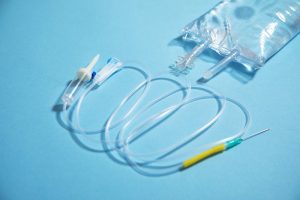Proper hydration is vital for your body to function optimally, yet sometimes drinking fluids alone isn’t enough to replenish what the system needs. In such cases, intravenous (IV) fluids may be necessary – but how do you know if you need IV fluids?
This comprehensive guide will explore the various symptoms and indicators that may indicate the need for IV fluid therapy. You will discover the array of cues that your body may be sending out a cry for help. Understanding and heeding these signals can mean the difference between timely intervention and potentially dangerous complications.
Prepare to equip yourself with the knowledge to discern when IV fluids may be necessary. Let’s begin to better comprehend your body’s intricate hydration demands.
How Do You Know if You Need IV Fluids?
You might need IV fluids if you’re very dehydrated and can’t drink enough fluids. This can also be necessary if you’re experiencing severe vomiting or diarrhea or if you can’t keep fluids down due to illness.
Signs of severe dehydration include feeling very weak, having a fast heartbeat, a dry mouth, and little to no urine output. Severe dehydration can also cause confusion and dizziness.
Hence, a doctor can assess your condition and determine if IV fluids are necessary. Below, you can discover more about the signs on how to know if you need IV fluids for dehydration.

Signs of Severe Dehydration
Severe dehydration can cause alarming symptoms. One of the first signs that you need IV fluids is a rapid heartbeat, as the body tries to compensate for low fluid levels. Physical signs, like sunken eyes, appear due to fluid and volume loss.
Furthermore, cognitive impairment, such as confusion and mental fogginess, can occur when the brain lacks proper hydration. Another concerning indicator is a drastic decrease in urine output as the body tries to conserve what little fluid remains.
If you experience a combination of these severe symptoms, seek immediate medical attention. Moreover, extreme thirst and fatigue are also warning signs you should not ignore. In such cases, IV fluids may be crucial for replenishing and preventing complications.
What Happens During Rehydration With IV Fluids?
IV line insertion
When severe dehydration strikes, IV fluid administration is often the most effective way to rapidly replenish lost fluids and electrolytes. The process begins with a healthcare professional inserting a small plastic tube, known as an IV line, into a vein, usually in the arm or hand.
This method provides direct access to the bloodstream for fluid delivery. Unlike drinking fluids orally, IV fluids bypass the digestive system and are absorbed straight into the bloodstream, allowing immediate rehydration.
Fluid and electrolyte circulation
Once in the bloodstream, IV fluids circulate throughout the entire body, reaching all tissues and organs. This widespread distribution possibly helps restore proper fluid balance within cells.
Many IV solutions also contain vital electrolytes like sodium and potassium. As they circulate, these minerals correct potentially dangerous imbalances caused by dehydration.
Through this efficient administration and distribution, the body might rehydrate quickly, replenishing depleted fluids and electrolytes effectively. This process might help resolve symptoms and prevent further complications.
How to Prevent Dehydration in the First Place
Preventing dehydration begins with making hydration a priority throughout the day. You should drink fluids regularly, even before you feel thirsty, as thirst is an early sign of dehydration. Aim to drink at least 8 glasses or 2 liters of water daily, and consider increasing your intake in hot climates or during increased physical activity.
Maintaining a proper balance of electrolytes is also crucial. Minerals like sodium and potassium might help regulate fluid levels in your body. Plus, include electrolyte-rich foods and sports drinks in your diet, especially if you sweat heavily.
Furthermore, it’s important to monitor your hydration status to detect dehydration early. Watch for signs like thirst, dark urine, fatigue, or dizziness. Also, be extra careful in hot weather, during illness, or if you’re taking medications that may cause dehydration.
If symptoms persist or worsen, you must seek medical help promptly. Early intervention might prevent mild dehydration from becoming severe and requiring intensive treatment. Hence, stay proactive about hydration to avoid the dangers of dehydration.

Conclusion
Dehydration might have serious consequences, and knowing how to identify when you need to replenish your fluids intravenously is crucial. So, how do you know if you need IV fluids?
From monitoring your urine output to recognizing signs of dizziness, fatigue, and dry mouth, the key is to be attuned to your body’s signals. If you experience any of the symptoms discussed in this guide, don’t hesitate to seek medical attention.
Staying hydrated is vital for your overall health and well-being, and IV fluids might be a lifesaver in cases of severe dehydration. Remember, prevention is always better than cure, so make sure to drink plenty of fluids regularly.



